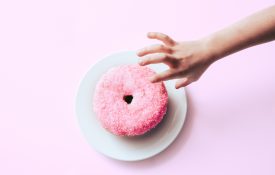-
New Research From Psychological Science
Read about the latest research published in Psychological Science: Five-Month-Old Infants Have General Knowledge of How Nonsolid Substances Behave and Interact Susan J. Hespos, Alissa L. Ferry, Erin M. Anderson, Emily N. Hollenbeck, and Lance J. Rips Research has shown that infants have a sophisticated understanding of the properties of objects, but it is less clear whether infants develop a similar understanding of nonsolid objects. Four- and 5-month-old infants were habituated to the sight of a solid object or the sight of a nonsolid substance (sand or liquid).
-
New Research From Psychological Science
Read about the latest research published in Psychological Science: The Evaluative Advantage of Novel Alternatives: An Information-Sampling Account Gaël Le Mens, Yaakov Kareev, and Judith Avrahami People often rate new items more favorably than old items. Why might this be? Theories explaining this phenomenon have suggested that new items may serve a purpose or solve a problem old items could not, or that through imitation of others use of new items, new items come into favor. The authors suggest that adaptive sampling may also account for the favoritism shown to novel alternatives. Specifically, people seek out positive experiences and avoid past negative experiences.
-

Americans Recognize ‘Past Presidents’ Who Never Were
A memory study suggests that a majority of Americans incorrectly think that Alexander Hamilton was a US president, and many believe the same about Benjamin Franklin, Hubert Humphrey, and John Calhoun.
-
Faces of Black Children as Young as Five Evoke Negative Biases
A new study suggests that people are more likely to misidentify a toy as a weapon after seeing a Black face than a White face, even when the face in question is that of a five-year-old child. The research is published in Psychological Science, a journal of the Association for Psychological Science. “Our findings suggest that, although young children are typically viewed as harmless and innocent, seeing faces of five-year-old Black boys appears to trigger thoughts of guns and violence,” said lead study author Andrew Todd, an assistant professor of Psychological and Brain Sciences at the University of Iowa.
-
New Research From Clinical Psychological Science
Read about the latest research published in Clinical Psychological Science: The Economics of Losing a Loved One: Delayed Reward Discounting in Prolonged Grief Fiona Maccallum and George A. Bonanno Prolonged grief (PG) is a syndrome marked by intense and prolonged bereavement and is accompanied by significant impairment. Researchers still have much to learn about PG, including how it influences decision making. People who had lost a parent, partner, or sibling in the past 1 to 3 years were assessed for prolonged grief, life experiences, depression, and life orientation (whether they were more optimistic or pessimistic in their expectations).
-

Early Poverty Disrupts Link Between Hunger and Eating
How much you eat when you’re not really hungry may depend on how well off your family was when you were a child, according to new research published in Psychological Science, a journal of the

